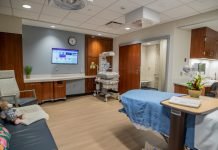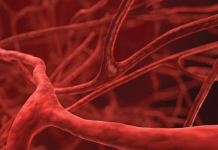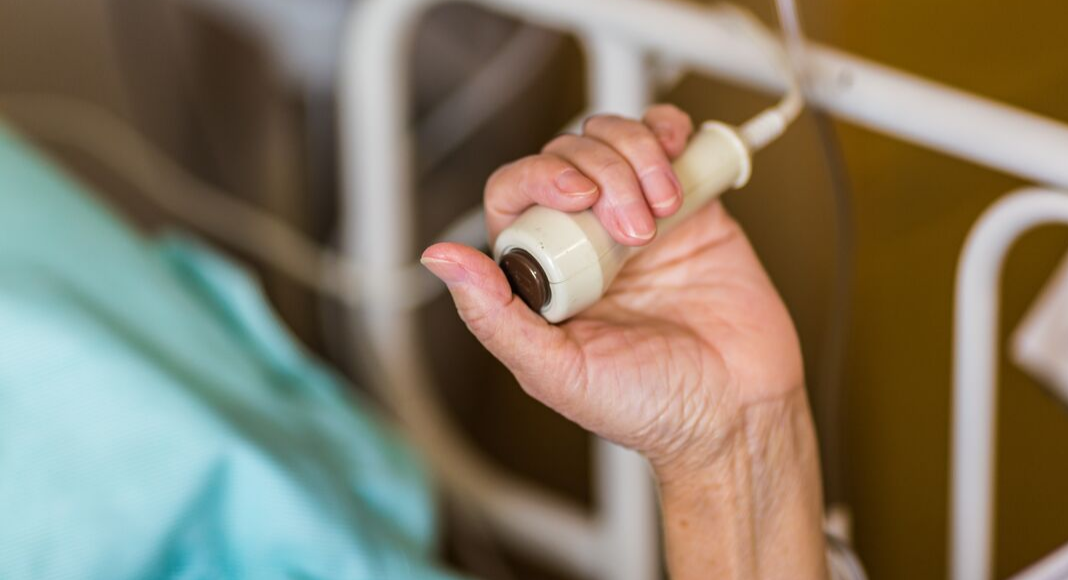This birth story series is sponsored by HCA Midwest Health.
In November 2019, I found out I was pregnant with my second child. I was labeled as a high-risk pregnancy due to being diagnosed with chronic Crohn’s-Colitis, an anti-inflammatory disease that is incurable, but manageable. My pregnancy this time around was perfect: I had no sickness, no horrid weight loss, and no issues with anything like my first pregnancy. However, on May 12, 2020, I went to my physician’s office in St. Joseph, Missouri, for my weekly routine check. I was 29 weeks and 2 days, and I was scheduled for a non-stress test and a growth scan. But, sadly, I did not even make it through the non-stress test without complications.
My doctor was overly concerned about decreased fetal movement, and she sent me to Labor & Delivery where they immediately hooked me up to monitors. I had never had issues with elevated blood pressures or swelling, but the L&D doctors told me my blood pressure was elevated at 145/94. I told them it was probably because I was anxious from all the movement going on around me. They proceeded to get bloodwork, urine samples, and scans, all while I waited for my husband to get off work and be there with me. I had blood pressure checks every 10 minutes, and they were not reassuring. After almost two hours, I was admitted and my husband finally was at my side. I was told I was being admitted because of numerous high blood pressure readings, lack of fetal movement, and blood/urine labs results. I then got a central IV line placed.
I was told that I had severe preeclampsia and HELLP syndrome. Preeclampsia is a pregnancy complication that causes high blood pressure, and HELLP syndrome is a serious complication of preeclampsia that affects the blood and liver.
I was in shock. I did not know what to think, but I was scared. I was catheterized and then the doctors immediately started magnesium through my IV. When I tell you I went from feeling bad to worse, I mean it – and it was fast. When I was told I was going to be taken via ambulance to another hospital, I broke down even more. I heard talk of cesarean section, and I knew at barely 29 weeks that is a huge risk. I was still almost three months early, and the thought terrified me.
My doctor then told me that I was being transferred via helicopter to Overland Park Regional Medical Center due to the nature of my condition being too hard to treat at their hospital.
I met the Maternal Transport Team, and they helped prepare me for the helicopter ride. I 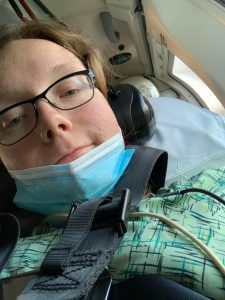 went with no bags packed or anything. I was scared and unsure about what was about to happen. The transport team helped calm my fears and get me ready for the trip. I made my husband go home and get a small bag of clothes for both of us to last for two to three days. Because of the pandemic, no other family besides my husband could come and that’s what made this whole situation harder.
went with no bags packed or anything. I was scared and unsure about what was about to happen. The transport team helped calm my fears and get me ready for the trip. I made my husband go home and get a small bag of clothes for both of us to last for two to three days. Because of the pandemic, no other family besides my husband could come and that’s what made this whole situation harder.
When I arrived at Overland Park Regional Medical Center, I was admitted to the Antepartum Unit, a special unit for women who need to be hospitalized before giving birth. I had to have another COVID test, which still sucked. I was on magnesium the entire night, which made me so weak I could not open my eyes or move and was constantly monitored with blood pressure readings and blood work. I had the best nurses. I remember moving around so much to get comfortable, and they would run in to adjust things to make sure they could hear baby perfect. They never complained – just told me to try to get some sleep and relax as much as I could, which was easier said than done.
Around 7 a.m., the doctor on call came in and I knew it would not be good. I could not even keep my eyes open at this point, but I could hear her. The only words that really mattered to me, “This is not good, we have had no improvement, we need to go in for an emergency c-section.” I felt lifeless, meaningless, and shattered. I was mad at myself, “Why can’t I carry a baby like normal, why do I have to be defective, why does my baby have to be punished by my body, she hasn’t even had time to grow!” I prepared myself for the worst-case scenario and it was coming true.
They wheeled me to the operating room as my husband got ready and waited in the 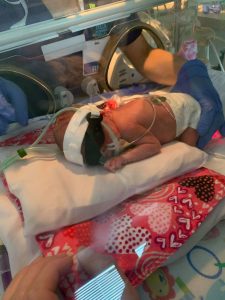 hallway. I struggled to even get on to the prep table and had to have assistance from four nurses due to my level of weakness. I was prepped for surgery. Within 20 minutes, I heard the doctor say, “I see a baby”, and I instantly started throwing up. I do not know if it was from the medication, anxiety, or both. But my baby girl was quickly shown to us before being whisked off. My husband followed all the Neonatal Intensive Care Unit (NICU) staff and doctors to see how our baby was doing. She was born at 8:38 a.m. on May 13, 2020, at 2 pounds, 7 ounces, and 14 inches long. She was not the smallest baby in the NICU by far, but she was super tiny to us. She was a fighter from day one.
hallway. I struggled to even get on to the prep table and had to have assistance from four nurses due to my level of weakness. I was prepped for surgery. Within 20 minutes, I heard the doctor say, “I see a baby”, and I instantly started throwing up. I do not know if it was from the medication, anxiety, or both. But my baby girl was quickly shown to us before being whisked off. My husband followed all the Neonatal Intensive Care Unit (NICU) staff and doctors to see how our baby was doing. She was born at 8:38 a.m. on May 13, 2020, at 2 pounds, 7 ounces, and 14 inches long. She was not the smallest baby in the NICU by far, but she was super tiny to us. She was a fighter from day one.
While I was wheeled up to the NICU to see my daughter, I do not remember much. I just remember seeing a figure so small and feeling my finger meet a small, tiny, little hand. I only got a couple of minutes with her as I was still very weak and tired from the magnesium and the surgery. My husband went to see her five or six times during the night to check on her and give me updates. He told me of a nurse named “Andy” and how amazing he was with our daughter, reading books to her, singing to her, drawing pictures on her board, and just being amazing through the entire night shift. He told me how he got to participate in her care, but when he was asked to help with a diaper, he said, “I want my wife to be able to do that first, so I’ll wait.” He was so caring for thinking of me, as I was down one floor still recovering.
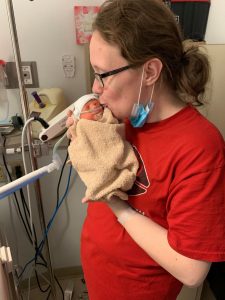 By the next morning, after being off the magnesium, the doctor asked how I was feeling, and I told her “Fine, I just want to go see my baby and hold her finally.” The doctor said that would be OK, and she highly encouraged it to help speed up the healing process. She asked what her name would be and I responded “Teagen.” I was able to get up, get my catheter out, and get into a wheelchair to go see my baby for the first time that I would ever remember. The moment I got up there, I broke down in tears. I was scared, and I felt helpless for her at that point. I got to hold my baby for the first time ever, skin to skin, and it was the best but scariest feeling of my life. I only got to hold her for about 20-30 minutes to avoid any repercussions of having her out too long. My husband touched her little head and made the most of every moment with a couple of forehead kisses and caresses. She was in tiny micro preemie diapers and had the tiniest hands and feet. She could not wear clothes yet just because of how small she was.
By the next morning, after being off the magnesium, the doctor asked how I was feeling, and I told her “Fine, I just want to go see my baby and hold her finally.” The doctor said that would be OK, and she highly encouraged it to help speed up the healing process. She asked what her name would be and I responded “Teagen.” I was able to get up, get my catheter out, and get into a wheelchair to go see my baby for the first time that I would ever remember. The moment I got up there, I broke down in tears. I was scared, and I felt helpless for her at that point. I got to hold my baby for the first time ever, skin to skin, and it was the best but scariest feeling of my life. I only got to hold her for about 20-30 minutes to avoid any repercussions of having her out too long. My husband touched her little head and made the most of every moment with a couple of forehead kisses and caresses. She was in tiny micro preemie diapers and had the tiniest hands and feet. She could not wear clothes yet just because of how small she was.
I was monitored for about four days post-delivery, and I was showing signs of acute post-partum preeclampsia. My blood pressures still were not good, never getting under 158/100, so I had to be put on more medication. It was a big trial and error. I started low dose, which did not help, so it went higher. I was finally discharged on day five. At my two-week post-op check, we found that my blood pressure was still uneven, so I was put on even stronger medication. While I was started to feel better, I had a lot of swelling. I did not get much sleep – we stayed in a hotel near the hospital thanks to Ronald McDonald House.
Our little Teagen was intubated only a couple days, on CPAP for only a couple days, and then nasal cannula for about one to two weeks. She had two main lines in her belly button that supplied all her medication and nutrients to help her grow. She also had a feeding tube from day one until about day 30. We had to wait until around day 15 to give her a sponge bath, which was a scary but amazing experience. By day 18, she was in nano preemie diapers, and by day 35 she was in preemie diapers.
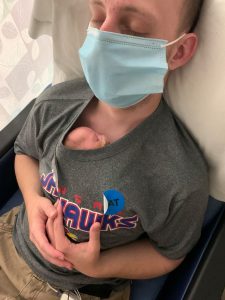 We grew remarkably close to our wonderful NICU nurses – especially Andy. We requested him for our main nurse, so whenever he was on shift we would have him. We got new drawings on our board every four to five days that we could admire for a few days. We were told by doctors to expect to stay 90-110 days, which would have been my due date, but with a little bit of faith and God, we only stayed 40 days.
We grew remarkably close to our wonderful NICU nurses – especially Andy. We requested him for our main nurse, so whenever he was on shift we would have him. We got new drawings on our board every four to five days that we could admire for a few days. We were told by doctors to expect to stay 90-110 days, which would have been my due date, but with a little bit of faith and God, we only stayed 40 days.
We were beyond blessed to have the experience we did. While it was not how it was planned, the staff at Overland Park Regional Medical Center made it manageable. My baby and I were never separated, and we were able to receive care under the same roof. They provided not only me but my child the best care well above mine and my husband’s expectations. Delivering during COVID was hard, and we sadly could not have visitors. But our family understood and enjoyed all the videos, pictures, and FaceTime calls watching our little Teagen fight.
Cynthia Davis lives in St. Joseph, Missouri and is the mom to two daughters, Sapphire Rose and Teagen Willow.
 For labor and delivery expertise, more moms in Kansas City choose an HCA Midwest Health hospital. Our OB/GYN teams at our delivering hospitals – Centerpoint Medical Center, Menorah Medical Center, Overland Park Regional Medical Center and Research Medical Center – ensure every woman has access to top-quality maternity care, including specialized services for women with high-risk pregnancies. By delivering more babies than anyone else in the region, our maternity hospitals deliver experience and safety. Learn more at hcamidwest.com/delivers.
For labor and delivery expertise, more moms in Kansas City choose an HCA Midwest Health hospital. Our OB/GYN teams at our delivering hospitals – Centerpoint Medical Center, Menorah Medical Center, Overland Park Regional Medical Center and Research Medical Center – ensure every woman has access to top-quality maternity care, including specialized services for women with high-risk pregnancies. By delivering more babies than anyone else in the region, our maternity hospitals deliver experience and safety. Learn more at hcamidwest.com/delivers.








